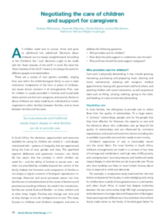Displaying 221 - 230 of 608
This chapter from the South African Child Gauge 2018 focuses on childcare and children’s caregivers in South Africa and aims to address the following questions: Who provides care for children? How does the state support or undermine care choices? Why and how should the state support caregivers?
Scholarship on transnational families has regularly examined remittances that adults abroad send to children in their country of origin. This article illuminates another permutation of these processes: family members in Senegal who establish relations with and through children in France through gifts and money.
This book takes readers on a journey that spans three decades and five continents, describing the work of SFAC to keep children in their families and communities or to find safe alternatives where this is not possible.
The current study examined placement, carer, and child characteristics related to perceived foster parent stress in a sample of 158 foster and kin carers in Queensland, Australia.
According to some estimates, a third of the adult Moldovan population is working abroad, often ‘leaving behind’ children in the care of relatives, neighbours or in orphanages. This paper from the Journal of European Studies investigates how such high migration rates affect Moldovan family life and personal definitions of identity and success.
The qualitative Australian study reported here explored how contact between grandparents and their grandchildren could be optimised after child-safety concerns.
This study examined the effects of grandparent–grandchild cohesion on the cross-lagged associations between depression and cultural beliefs about adversity in a sample of 625 rural left-behind children in China.
The objective of this study was to identify different kin and fictive kin network support profiles available to children in foster care and examine whether these profiles predict behavioral outcomes.
The research objective of this study was to evaluate the effectiveness of intervention programs that aim to enhance the well-being of grandparent caregivers and the developmental outcomes of grandchildren and identify useful program components.
The objective of this study is to evaluate the effectiveness of intervention programs that aim to enhance the well-being of grandparent caregivers and the developmental outcomes of grandchildren and identify useful program components.

